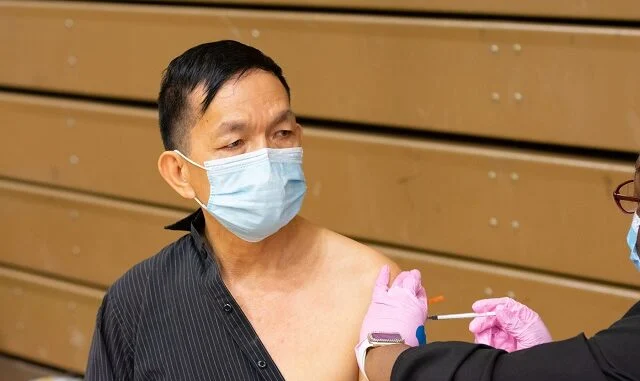
Paul Za gets a COVID vaccine shot while at the summit. Photo by Leita Cowart for GSU.
By Logan C. Ritchie
The campus of Georgia State University Perimeter campus was packed with Clarkston residents, non-profit organizations, and academic researchers on May 14.
More than 250 people participated in an expo hosted by the Prevention Research Center at GSU, a CDC-funded entity that works to address the public health disparities of refugees and immigrants in Clarkston.
Clarkston Mayor Beverly H. Burks and councilmember Awet Eyasu facilitated a session on housing. In November, the city’s first affordable housing community for seniors opened.
Clarkston Summit 2022 was an all-day event to help shape the future of the Clarkston community’s health, according to a press release. In addition to housing, speakers explored early learning and food security.
Mary Helen O’Connor is the director of the Clarkson Center for Community Engagement and deputy director of the Prevention Research Center at Georgia State University. She said the event was inspiring.
“The most exciting part of the summit was the robust participation from our community residents,” O’Connor said. “Seeing so much diversity leading the conversation and so much collaboration among participants was inspiring. It is evidence that when communities make a commitment to collaborate and share resources, they are able to solve even the most complex and critical issues.”
Thirty non-profit organizations were at the summit, including Clarkston Community Center, New American Pathways, Refugee Women’s Network, Open Hand Atlanta, IRC Atlanta, NAMI DeKalb, Coalition of Refugee Service Agencies, GA Refugee Health and Mental Health/ The Well Refugee Center, Friends of Refugees, The Center for Victims of Torture, Emory University School of Medicine and Emory Rollins School of Public Health, CDC Foundation, and CORE (Community Response Relief Effort).
As of May 10, 74.5% of Clarkston residents are fully vaccinated. The higher-than-expected inoculation numbers are the result of targeted, culturally competent vaccine education and events hosted by trusted institutions on the ground, ranging from refugee resettlement agencies to local health clinics, according to a press release.
Read the original story on TuckerObserver.com.











